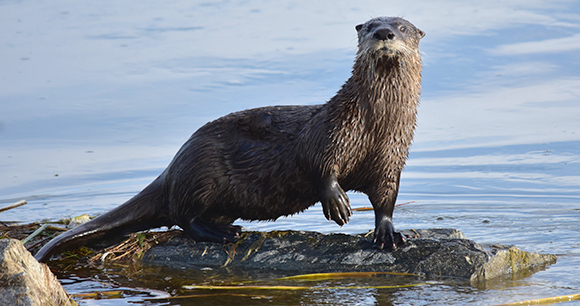
Washington, DC—Today, the Animal Welfare Institute (AWI) announced the seven recipients of its Christine Stevens Wildlife Award who are developing innovative, less intrusive wildlife study techniques and more humane methods of resolving conflicts between wild animals and humans.
Established in 2006, the award provides individual grants of up to $15,000 and is named in honor of AWI’s late founder and longtime president, who dedicated her life to reducing animal suffering both here and abroad. Stevens founded AWI in 1951 to end the cruel treatment of animals in experimental laboratories. Inevitably, her work expanded to take on other animal welfare causes, including protecting vulnerable species, reforming methods used to raise animals for food, banning steel-jaw leghold traps, ending commercial whaling, and much more.
“The winners are compassionate scientists, managers and advocates who embody the legacy of Christine Stevens,” said Cathy Liss, president of AWI. “From enlisting drones to monitor the population of a threatened rattlesnake, to using digital acoustic tags to examine close encounters between boats and Florida manatees, these pathbreaking research projects demonstrate less intrusive methods to study wildlife and offer humane solutions to human-wildlife conflicts.”
The 2018 Christine Stevens Wildlife Award grant winners are:
- Dr. James Anderson of West Virginia University for developing noninvasive genetic and environmental DNA methods for monitoring salamander distribution to aid in conservation efforts.
- Stacy Cotey of Michigan Tech University for analyzing the snow tracks left by northern river otters to create individual genetic profiles to better monitor the animals’ behaviors, population numbers and genetic diversity.
- Dr. Maureen Murray of the Tufts University Wildlife Clinic for determining accurate methods of screening red-tailed hawks to document exposure to dangerous anticoagulant rodenticides.
- Dr. Susan Parks of Syracuse University for using noninvasive digital acoustic tags to quantify how often Florida manatees are involved in close encounters with oceangoing vessels and to assess their behavioral responses.
- Christine Proctor of Harrisburg University of Science and Technology for using thermal imaging captured via drones to evaluate the population status of the eastern massasauga rattlesnake, a threatened species.
- Dr. Tracey Tuberville of the University of Georgia for studying the dispersal, health and survival of “waif” gopher tortoises (gopher tortoises who have been injured, collected illegally or have unknown origins), to determine whether these formerly captive tortoises are suitable for release into the wild.
- Dr. Andrew Von Duyke of the North Slope Borough Department of Wildlife Management for monitoring polar bears of the Alaska-Chukotka subpopulation by sampling environmental DNA from snow tracks to genetically “fingerprint” individual animals and estimate the size of the subpopulation.
For more information about the Christine Stevens Wildlife Award and the 2018 winners, please visit https://awionline.org/content/christine-stevens-wildlife-awards.
Margie Fishman, (202) 446-2128, [email protected]